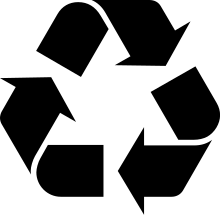Drug recycling
Drug recycling is the idea that health care organizations or consumers with unused drugs can transfer them in a safe and appropriate way to another consumer who needs them.[1] This would happen through a specialized pharmacy or medical organization which would oversee and mediate the process.[1]
It is traditional to expect that consumers get prescription drugs from a pharmacy and that the pharmacy got their drugs from a trusted source.[1] In a drug recycling program, consumers would access drugs through a less regulated supply chain and consequently the quality of the drugs could be lower.[1] Advocates and opponents of drug recycling programs differ in judging the risk of the less regulated supply chain lowering the quality of drugs which reach the consumer.[1]
Various regional governments in the United States offer drug recycling programs.[2][3] As of 2010, Canada had fewer drug recycling programs than the United States.[4]
Various organizations and governments are experimenting with different ways to manage drug recycling programs.[5] Many drug recycling programs only take drugs from professionals, and never from patients.[5] Drug recycling programs are not designed to be useful for consumers seeking to dispose of drugs.[5] These programs also are not intended to lessen the environmental impact of pharmaceuticals and personal care products.[5] Typically they only accept medication which has not expired and which is in unopened packaging.[5] When re-using recycled drugs, they only go to specific pharmacies which are prepared to address the special requirements of participating in a recycling program.[5] Usually, drug returns happen without financial compensation.[5]
SIRUM, an acronym for "Supporting Initiatives to Redistribute Unused Medicine", is a nonprofit organization which advocates for drug recycling.
References
- Pomerantz, JM (23 April 2004). "Recycling expensive medication: why not?". MedGenMed : Medscape general medicine. 6 (2): 4. PMC 1395800. PMID 15266231.
- Nelson, Gayle (26 May 2015). "The Next Recycling Frontier: Prescription Drugs". Nonprofit Quarterly. Retrieved 4 May 2017.
- Inskeep, Steve (22 May 2015). "Poor Residents Benefit From Oklahoma County's Medicine Recycling". Morning Edition. NPR.
- Doyle, S. (8 February 2010). "Canada lags behind United States in drug return, reuse and recycling programs". Canadian Medical Association Journal. 182 (4): E197–E198. doi:10.1503/cmaj.109-3171. PMC 2831677. PMID 20142378.
- Cauchi, Richard; Hanson, Karmen; Robinson, Savannah (31 March 2017). "State Prescription Drug Return, Reuse and Recycling Laws". www.ncsl.org. National Conference of State Legislatures. Retrieved 9 May 2017.
